INFORMATION
Overview:
PON technology has been applied more and more widely in the domains of private network communication such as electric power, coal mining, broadcast and television, and army. As we know, the transmission distance in a PON system is restricted within 20km scope. Owing to the restriction of OLT transmission distance, the quantity of ONU devices has to be reduced in order to lengthen the transmission distance, which results in great waste of OLT interfaces and optical fiber resources occupied by OLT. Furthermore, the optical power is often small but the transmission distance typically exceeds 20km in these applications, in particular, the optical fiber resources may very possibly become inadequate at the entrances of optical fiber to communities or key clients.
BAUDCOM’s GPON OEO repeater amplifier is an optical transmission equipment which magnify and reshape signals during optical transmission process. The GPON repeater amplifier can provide 3R (i.e. re-amplification, reshaping and retiming) regeneration to signals during optical transmission, amplify weak input of optical signals, complete regeneration of electrical signals, and make transmission distance of PON become longer and support more extended users.The PON OEO fiber repeater/amplifier device can effectively save OLT quantity and lengthen network transmission distance. The OEO fiber repeater equipement have been widely applied for long-distance transmission in various optical communication applications.
Its advantages include in small size of optical signals, being economical and safe, and simple installation etc. Therefore, it can be applied in various optical transmission fields.
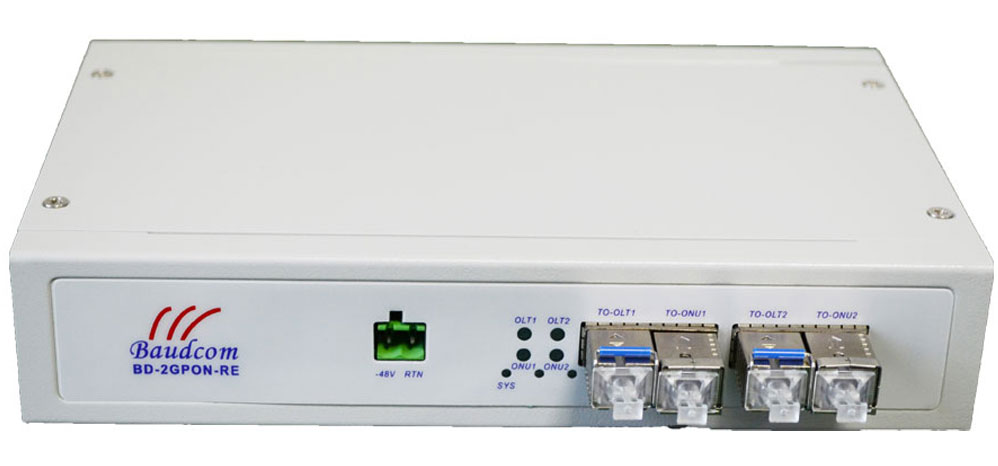
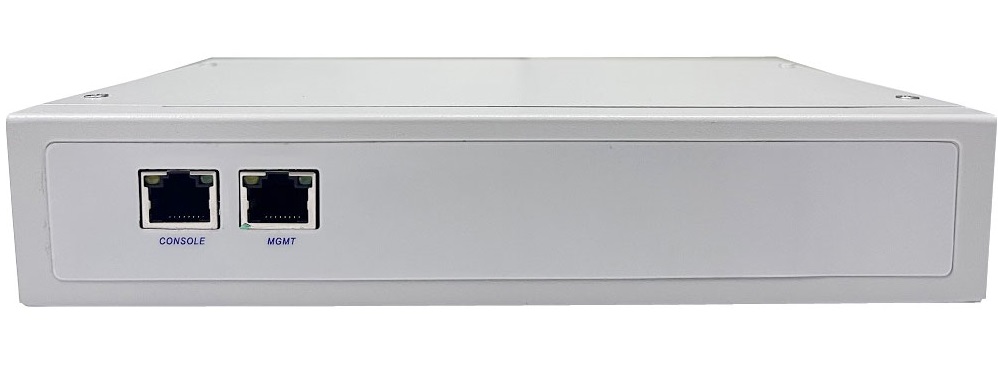
Features:
Ø In accord with IEEE802.3ah and Chinese communication industrial standard (YD/T 1475-2006);
Ø Extend PON system transmission distance from 20km to 60km or even 80km;
Ø Uplink: supports combination of different types of PON OLT interfaces and different physical connectors;
Ø Downlink: supports different types of PON ONU interfaces (shunt or ONU interface).
Ø Be compatible with GPON system;
Ø Be compatible with GPON OLT and ONU equipment manufactured by different vendors;
Ø 1U desktop equipment, small space occupation and low power consumption;
Ø Support kinds network management modes, local management on terminal console; Telnet-based remote logon network management, Web-based and SNMP-based direct GUI management.
Ø Supporting GPON OEO relay function
Ø 3R signal regeneration
Ø Supporting 1550nm and 1620nm dual wavelength storage with externally connected passive equipment
GPON OEO transmission performance
Uplink: supporting receipt and transmission of 2.488G/s or 1.25G/scontinuous signals.
Downlink: supporting receipt and transmission of 1.25G/sburst-mode signals.
Supporting 60km/1:64 ODN network expansion
Where, OLT--->OEO BOX trunk supports 40km transmission;
OEO BOX--->ONU supports 20km/1:64 ODN power budget. Refer to the below figure for details:
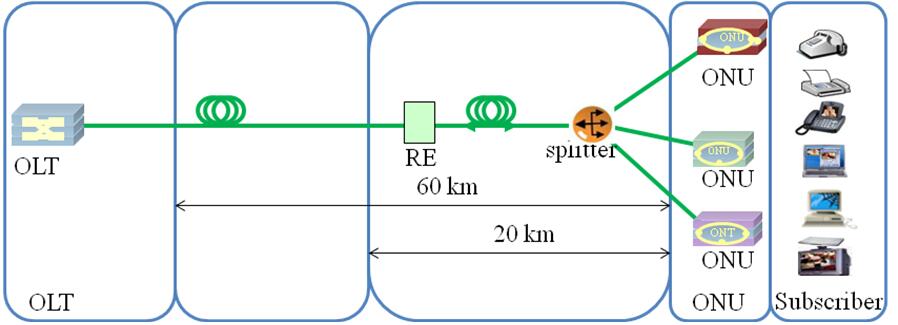
Properties of GPON OEO’s physical layer
OEO Properties of ONU/OLT optical interface’s physical layer
–Receiving sensitivity of OLT optical interface ≦ -28dBm
–Optical power of ONU optical interface ≧ +1dBm
–Receiving sensitivity of ONU optical interface ≦ -28dBm
–Optical power of OLT optical interface ≧ +0.5dBm
–Burst-mode signal time ≦ 50ns
–Fast AGC attenuation ≧ 10dB
Applying SFF or SFP optical interface module, connected as shown in the above figure.
In GPON system, it will not generate any error code to the system and have no adverse effects on transmission or performance.
Compatibility
1) Be compatible with GPON system;
2) Be compatible with GPON OLT and ONU equipment manufactured by different vendors;
3) Be capable of adapting to 1550nm analog video and 1620nm OTDR dual wavelength storage
Power supply
Power supplied by Rack chasiss
Power supply : 12VDC
Power Consumption: <=5 Watts
Environment condition
Operating temperature: -20C~+70 C
Storage temperature: -40 C~+80 C
Relative temperature:95% (uncondensed)
Typical Application
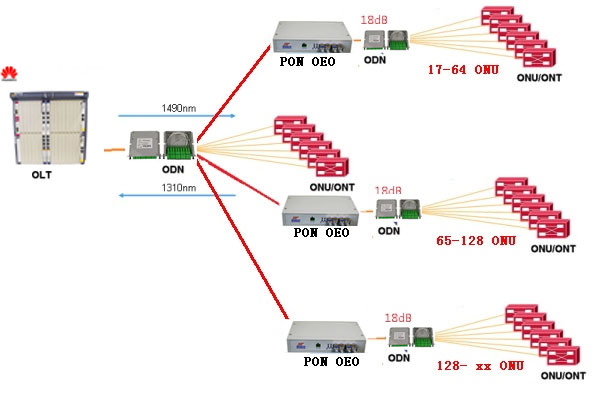
1. Extend Transmission Distance

Note: GPON system shall support measurement of corresponding physical distance, and PON OEO device can only lengthen the distance on the basis of optical properties.
2. Extension of splitting ratio
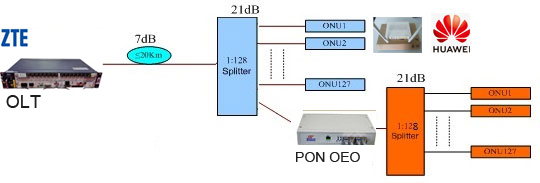
Note: GPON system shall support online of corresponding 256 ONU, and PON OEO can only extend the splitting ratio on the basis of optical properties
3. Parallel application

Note: GPON system shall support measurement of corresponding physical distance and differential range, and PON OEO device can only lengthen the distance on the basis of optical properties.
FAQ:
Question: There is no compatibility problem with the Huawei OLT?
Answer: Our GPON repeater have tested succesffully with Huawei OLT/ ZTE OLT/Fiberhome/Alcatel-lucent OLG. Our GPON repeater can work well with Huawei GPON OLT, do not worry about the compatibility.
Question: Is there any guarantee on the product?
Answer: Yes. The device warranty time is TWO years. Don’t worry about the device’s quality, its quality is very high. The GPON repeater device can work stably for many years.
Question: Will I have technical support if required?
Answer: Yes, we will provide you technical support. The PON device will be used smoothly in your FTTH system application with our technical support.
Question: Is the GPON repeater equipment suport AC 110V? The type of energy coenctor is type B for South America?
Answer: Our GPON OEO repeater equipement have been sold to many countries around the world. We also have many clients in Sourth America area. Our GPON repeater can support AC220V and AC110V power supply. We will provide the power plug which is suitable for your country.
Application story:
GPON OEO Repeater Successfully Applicated in Thailand
Ordering information
Related Products
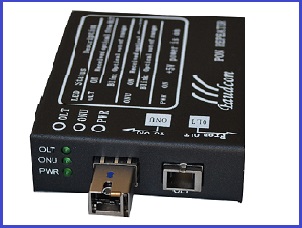
|
PON OEO Repeater EPON Amplifier
PON technology has been applied more and more widely in the domains of private network communication such as electric power, coal mining, broadcast and television, and army.
|
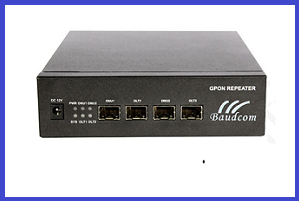
|
2PON OEO GPON Repeater Amplifier
BAUDCOM’s GPON OEO equipment is an optical transmission equipment which magnify and reshape signals during optical transmission process.
|
